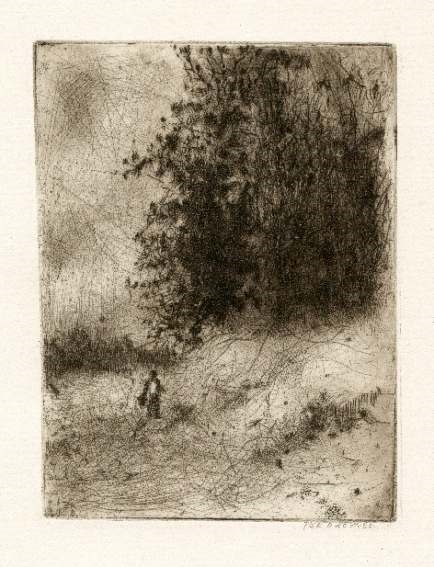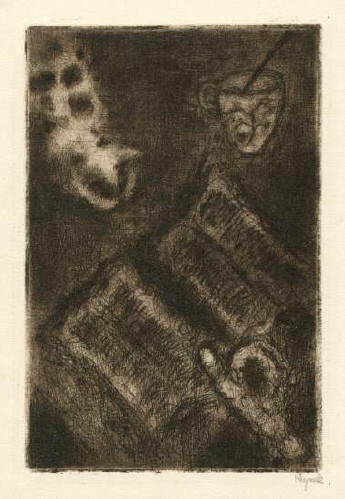Bohuslav Reynek: Poet and Visual Artist
Bohuslav Reynek:
Figure in the Landscape (image)
and
A Fool (poem)

Bohuslav Reynek: Figure in the Landscape, drypoint, 18 x 14 cm.
*******
Bohuslav Reynek: A Fool
In my village, I’m the fool.
Sad dogs know me — sad white school
of sleepy dogs that drift away
into the distance. They don’t bay.
They keep me happy from afar —
cloudish dogs is what they are
that run about the sky’s massif.
And we’re all drunk on grief.
Where we wander we don’t know.
Ancient shepherd, as I go,
bless my soul with your great gifts
of moon and these long wakeful shifts,
heavy, gashed time and again
like a bleeding heart. Amen.
*******
‘A Fool’ is wittily self-effacing but also philosophically and spiritually profound, drawing on both the Ancient Greek tradition of cynicism (from kuōn, or “dog”) and the Christian tradition of fools for Christ’s sake. (Harriet Staff)
*******
Bohuslav Reynek (1892-1971) was one of the most important Czech poets, writers, painters, graphic artists and translators of the 20th century. In 1904-1911 he studied at Grammar School in Jihlava (German Iglau), Bohemia. There he learned both French and German. After a short time studying at Prague University, he left Prague for Petrkov. In 1926 he married the French poet Suzanne Renaud, whose work he would later translate into Czech. In 1914, he started his long-time and close cooperation with Josef Florian in the town of Stará Říše translating, illustrating and publishing his own poetry. He and Suzanne had two sons. In 1949 his farmstead was confiscated by the new Communist state (he and his family were allowed to live on in Petrkov) and the publishers that had heretofore published his work were closed down. He died in 1971 on his farmstead.

Bohuslav Reynek: Still Life in the Kitchen, 1960
Reynek’s poems are meditative and inspired by the Czech landscape, rural life and a deep Christian faith. What is noteworthy is the delicate way in which religious themes are refracted through images of his immediate surroundings; the poems invest everyday objects and scenes (such as the farm animals, their byres, the rhythms of the working week) with a spiritual luminescence, a bright edge, and this is done so delicately that at no point does it feel imposed. He employs, for the most part, traditional forms, with inventive rhymes.
After the Communist revolution of 1948 Reynek's books were prohibited and those of public libraries liquidated because of Reynek's Christian faith. He died poor with his works banned but became a hero to young Czech poets of the 1960s and 1970s, the most prominent of which were Ivan Martin Jirous, Zbyněk Hejda and Ivan Diviš. His work was published in exile and after 1989 a critical edition of his poems was completed and edited by Torst Publishing House, Prague. (Wikipedia)
*******
Recently (2018) Bohuslav Reynek’s poems have been collected in The Well at Morning: Selected Poems, 1925–1971 (Karolinum Press, Charles University, 2018), translated by Justin Quinn.
.jpg)
An excerpt from the review at Los Angeles Review of Books: “From the three essays at the end of the volume, we learn that Reynek was always a rural farmer but began his creative life contributing translations of contemporary German and French poetry to the Czech Stará Říše publishing house, based near his home in the Czech-Moravian Highlands. He began his career, as did so many of his Eastern and Central European contemporaries, as an epigone of the Symbolists, but he soon found his own voice — a voice that was spare and humble, at times proto-absurdist, and also capable of wielding powerful biblical imagery. It is a voice that, according to Quinn, “insists on broader continuities with the European poetic tradition, which glide easily past temporary glitches like communism. Like the poetry of Boris Pasternak’s imaginary Dr. Zhivago, Reynek’s work seems to avoid political realities, focusing instead on living, on bearing witness and celebrating what seems small and inconsequential but, to the poet, reflects deeper and more lasting spiritual truths.”
More:
- April 2024: Denise Levertov & Ernst Barlach- January 2024: Wendell Berry and Carol Aust
- November 2023: Luci Shaw & Botticelli
- March 2023: Jill Baumgaertner & Liviu Mocan
- September 2022: The Uncompleted Man
- March 2022: Annukka Laine
- January 2022: Megan Fisher
- November 2021: Luci Shaw & Worku Goshu
- September 2021: Pádraig Ó Tuama & Leo G. Franchi
- May 2021: Malcolm Guite & Unknown
- January 2021: Emily Dickinson & Henri Matisse
- December 2020: Allan Boesak & Harm Visser
- June 2020: Luci Shaw & Sebastian Wien
- November 2019: Dennis O’Driscoll & David Robinson
- June 2019: C.S. Lewis & Wayne Adams
- May 2019: Malcolm Guite & Andrea Mantegna: Ascension
- May 2019: Denise Levertov & Ernst Barlach
- October 2018: Sándor Reményik & Ildikó Mecséri
- August 2018: Abigail Carroll & Caravaggio
- March 2018: George MacDonald & James Ensor
- January 2018: Wendell Berry & Annukka Laine
- November 2017: Mary Oliver & Pauline Baynes
- August 2017: Ellyn Maybe & Pablo Picasso
- April 2017: Lucy Shaw & Henry Ossawa Tanner
- April 2017: Denise Levertov & Diego Velazquez
- February 2017: David L. Hatton & David L. Hatton
- November 2016: Dennis ODriscoll & David Robinson
- June 2016: Luci Shaw & Marietha Smit
- April 2016: Robert Browning & Pauline Baynes
- March 2016: Wendell Berry & Carol Aust
- January 2016: Dante G. Rossetti & Dante G. Rossetti
- December 2015: Sufjan Stevens & Geertgen tot Sint Jans
- September 2015: Thomas Merton & Andre Racz
- June 2015: Frances Bellerby & Jeltje Hoogenkamp
- March 2015: Christine Perrin & Ted Prescott
- January 2015: Jan Krist & Gor Chahal
- December 2014: Sufjan Stevens & Geertgen tot Sint Jans
- November 2014: David L. Hatton & David L. Hatton
- July 2014: Chris Lorensson & Dylan Clements
- June 2014: Jonathan Evens & Henry Shelton
- April 2014: Gerlind Krause & Worku Goshu
- April 2014: Christine Perrin & Michelangelo
- February 2014: David Hatton & Angelo da Fonseca
- January 2014: James Weldon Johnson & Aaron Douglas
- January 2014: Hannah Main-van der Kamp & Liviu Mocan
- December 2013: Christine Perrin & Fra Angelico
- December 2013: Luci Shaw & Botticelli
- November 2013: Christine Perrin & Luca Signorelli
- October 2013: Hannah Main-van der Kamp & Tanja Butler
- October 2013: James Weldon Johnson & Aaron Douglas
- October 2013: Marilyn Chandler McEntyre & Johannes Vermeer
- September 2013: The Renewal of Ekphrasis by John Skillen


